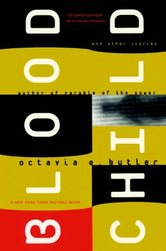|
Originally posted at The Hooded Utilitarian. How do critiques of identification complicate Western models of empathy? What might empathy look like, and produce, when it doesn’t require identification? What about more difficult cases in which the reader is required to empathize with the oppressor, or with more complicated protagonists? – Megan Boler, “The Risks of Empathy”  I didn’t agree to participate in this roundtable on Octavia Butler because I enjoy her writing, but rather because I don’t. My admiration for her storytelling is nothing short of begrudging; I have to work at it. And I’ve always been careful to attribute my resistance to matters of personal taste. Butler is, after all, a beloved award-winning writer in science fiction, a pioneer who helped open a space for communities of black speculative fiction writers that I adore, including Nnedi Okorafor, N.K. Jemison, Tannarive Due, and Zetta Elliot. So if I find the slug-like aliens in Dawn nauseating or if the pedophilic undertones in Fledgling nearly keep me from finishing the novel, then I assume that’s my problem. My displeasure doesn’t prevent me from recognizing Butler’s importance in my African American literature courses and I teach her fiction whenever I can, with her 1979 novel Kindred being the most popular. Students are eager to embrace the story’s invitation to see the interconnected perils of slave resistance and survival through Dana’s modern eyes, grateful that the narrative’s historical corrective comes at the comfortable distance of science fiction tropes. The book raises provocative questions for debate, although I admit to being troubled by how often readers come away from Kindred convinced that they now know what it was like to be enslaved. Too often, their experience with the text is cushioned by what Megan Boler characterizes as “passive empathy”: “an untroubled identification that [does] not create estrangement or unfamiliarity. Rather, passive empathy [allows] them familiarity, ‘insight’ and ‘clear imagination’ of historical occurrences – and finally, a cathartic, innocent, and I would argue voyeuristic sense of closure (266). Much of Butler’s fiction doesn’t work this way, however. Estrangement and unfamiliarity, particularly in relation to ugliness and the repulsiveness of the alien body, are central to her work. And this is what gets me. The non-human creatures she imagines make me cringe and their relationships with humans in her fiction are even harder to stomach. My first reaction to the Tlic race in Butler’s 1984 short story, “Bloodchild,” was disgust, made all the more unnerving because of the great care Butler seemed to take in the description of the strange species; the serpentine movements of their long, segmented bodies resemble giant worms with rows of limbs and insect-like stingers. |
AboutAn archive of my online writing on comics, literature, and culture. (Illustration above by Seth!) Categories
All
Archives
July 2020
|

 RSS Feed
RSS Feed